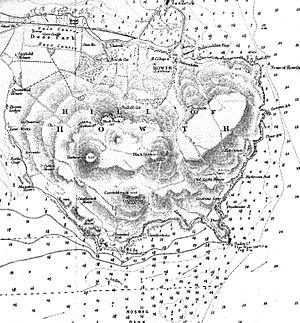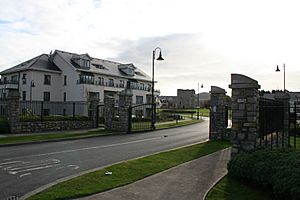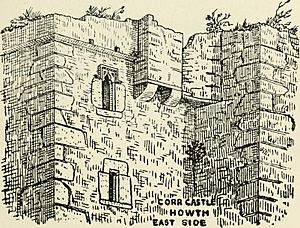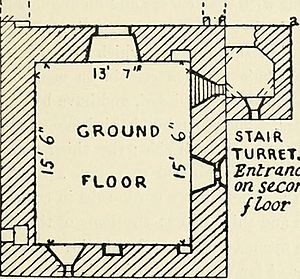Corr Castle facts for kids
Quick facts for kids Corr Castle |
|
|---|---|
|
Caisleán an Chorraigh
|
|
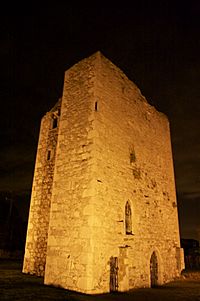
The castle at night
|
|
| General information | |
| Status | Protected Structure (RPS: 0551) RMP: DU015-025 |
| Type | 15th century castle - tower house |
| Town or city | Sutton, Dublin |
| Country | Ireland |
| Coordinates | 53°23′24″N 6°05′39″W / 53.389922°N 6.094060°W |
| Current tenants | Vacant |
| Renovated | partially in the early 2000s |
| Technical details | |
| Material | coursed masonry with dressed limestone quoins |
| Floor count | 4 storey |
Corr Castle (which means "Castle of the round hill" in Irish) is an old tower house built a long time ago. It was likely constructed in the 1400s. This castle is located in Sutton, Dublin, in Ireland.
It's called an "L-plan" castle because of its shape. It sits inside the lands of Howth Castle. The castle was probably built on high ground. This helped it guard the narrow strip of land at Sutton. This strip was the only way to reach Howth Castle and the port of Howth by land. Sometimes, people have called it The Dane's castle.
Contents
Discovering Corr Castle's Past
Who Lived at Corr Castle?
It seems that a family called the Cornwalsh family lived in this area a very long time ago. They were from Wales. The nearby hill and their Welsh background gave them their name. We don't know for sure if the Cornwalsh family, or a later family called the Whites, built the castle.
However, we do know that the White family owned the castle in the mid-1500s. Later, in 1579, Christopher St Lawrence, 8th Baron Howth took ownership. The castle might have been made better or upgraded around that time.
Corr Castle and Horse Racing
Much later, from 1829 to 1842, Corr Castle was used in a fun way. It became a grandstand and a special spot for the Howth Park Racecourse. The 30th Lord of Howth used it for his horse races.
The race track started near Howth Castle. It then circled around Corr Castle by the Burrow Road. The Lord of Howth had black and white racing colors. These colors were later used by Howth Celtic Football Club. The club started in 1962 on part of the Howth Castle grounds.
What Happened to the Castle?
In the late 1800s and early 1900s, the land around the castle was used as a quarry. This means people dug out stone from the ground. The tower, some other buildings, and a windmill pump were some of the few things left standing.
Old photos from the 1930s by Francis Browne SJ show more of the castle. They seem to show parts of the outside castle walls or a bawn (a defensive courtyard).
In the early 2000s, parts of the castle were fixed up. Today, the castle is safe and sits within a private apartment complex. It's now a cool architectural feature. You can still see it clearly from the nearby Howth Road.
What Makes Corr Castle Special?
Protected Status
Corr Castle is a very important old building. It is listed on the Fingal County Council Record of Protected Structures. This means it's officially protected. The record describes it as "Remains of 16th century castle of St. Lawrence family in open space at centre of apartment development."
It's also on the Record of Monuments and Places. This record points out the special architectural details and historical importance of the building.
Castle Features to Look For
You can still see parts of the old bawn wall and turrets. There are also garderobe chutes, which were like old toilets or drains. The castle has battlements (the top parts of walls with openings for defense) and machicolations (openings for dropping things on attackers). There's also a room with a corbelled roof, which means the roof is supported by stones sticking out from the walls.
Even though the tower has defensive features, it might not have been built just for fighting. It probably worked as a look-out tower. Over time, it was also used as a place to live.
Other cool features have been noted since the 1700s. These include a stone fireplace and pointed stone arch windows. There are also carved designs. One is a bold chamfer (a beveled edge) with a damaged flower design on the northeast side of the main tower. Another is a rough human face carved on a stone sticking out on the east side.
Ancient Discoveries Around the Castle
Tests done around the tower have found signs that people lived there as far back as the 1200s and 1300s. This shows the area has a very long history.
Today, the tower is well-preserved and protected. It is located inside a gated apartment complex. No new buildings are allowed to be built close to it.


